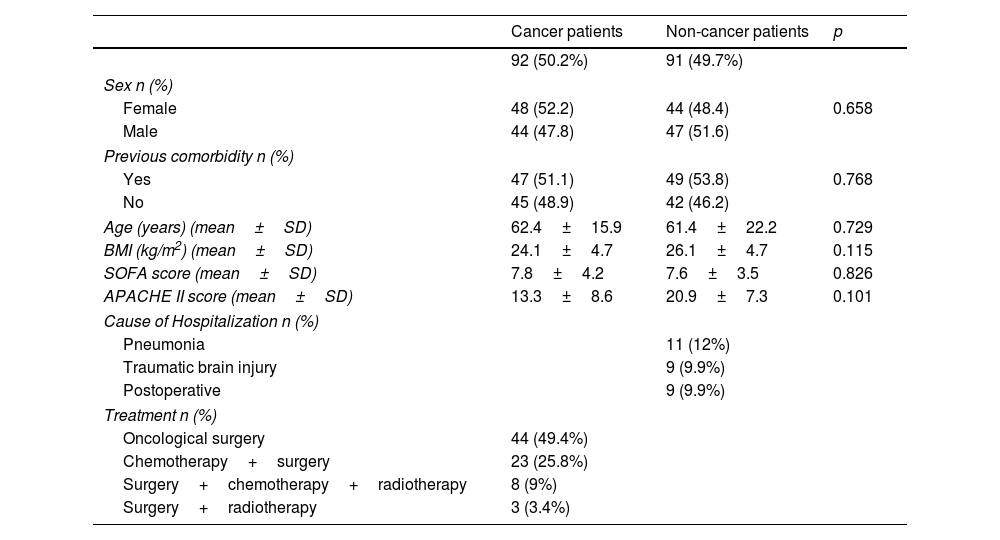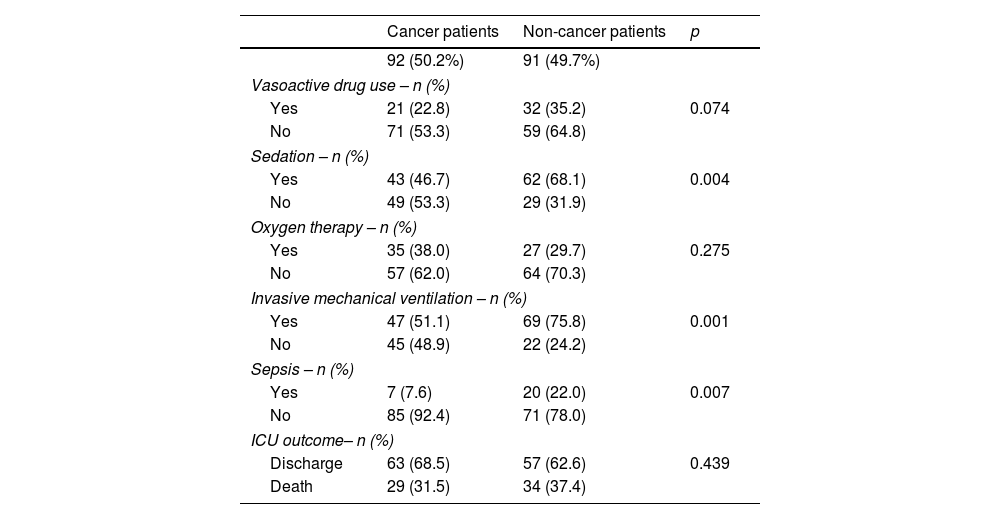The aim of this study was to identify the profile of cancer patients admitted in the intensive care unit (ICU) and compares the outcomes with non-cancer patients hospitalized in the same period.
DesignThis is a cross-sectional study.
SettingData were collected from medical records at Hospital Universitário Santa Terezinha, Joaçaba-SC, Brazil.
PatientsAdmitted at ICU from April to November 2018.
InterventionsNA.
Main variables of interestICU outcomes.
ResultsOf the 183 patients, 92 were cancer patients and 91 were non-cancer patients. There was a predominance of females for cancer and males for non-caner group, mostly elderly. Most hospitalizations of cancer patients were postoperative (49.4%). The cause of hospitalization of non-cancer patients was pneumonia, followed by traumatic brain injury, postoperative period, polytrauma, and septicemia. On the Sequential Organ Failure Assessment (SOFA) scale, cancer patients scored an average of 7.8 (±4.2) and on the Acute Physiology and Chronic Health Disease Classification System (APACHE II) 13.3 points (±8.6), whereas non-cancer scored 7.6 (±3.55) and 20.9 points (±7.2), respectively. Non-cancer patients used more invasive mechanical ventilation and vasoactive drugs.
ConclusionCancer patients received less sedation and used less mechanical ventilation than non-cancer patients. In addition, cancer patients had a lower APACHE II score, denoting a less severe condition. Most surgical cancer patients demonstrate to benefit from intensive care, but it is still necessary to create more specific criteria for ICU admission.
El objetivo de este estudio fue identificar el perfil de los pacientes con cáncer ingresados en la unidad de cuidados intensivos (UCI) y comparar los resultados con los pacientes no oncológicos hospitalizados en el mismo período.
DiseñoSe trata de un estudio transversal.
ÁmbitoLos datos se recogieron de las historias clínicas.
PacientesIngresados en la UCI de abril a noviembre del año 2018 en el Hospital Universitário Santa Terezinha, Joaçaba-SC, Brasil.
IntervencionesNA.
Variables de interés principalesResultados de la UCI.
ResultadosDe los 183 pacientes, 92 eran pacientes con cáncer y 91 eran pacientes sin cáncer. Hubo predominio del sexo femenino para el cáncer y del sexo masculino para el grupo sin cáncer, en su mayoría ancianos. La mayoría de las hospitalizaciones de pacientes oncológicos fueron postoperatorias (49,4%). La causa de hospitalización de los pacientes no oncológicos fue la neumonía, seguida del traumatismo craneoencefálico, el postoperatorio, el politraumatismo y la septicemia. En la escala Sequential Organ Failure Assessment (SOFA), los pacientes oncológicos obtuvieron una puntuación media de 7,8 (±4,2) y en el Acute Physiology and Chronic Health Disease Classification System (APACHE II) 13,3 puntos (±8,6), mientras que los no oncológicos obtuvieron una puntuación de 7,6 (±3,55) y 20,9 puntos (±7,2), respectivamente. Los pacientes sin cáncer utilizaron ventilación mecánica más invasiva y fármacos vasoactivos.
ConclusiónLos pacientes con cáncer recibieron menos sedación y usaron menos ventilación mecánica que los pacientes sin cáncer. Además, los pacientes con cáncer tenían una puntuación APACHE II más baja, lo que indica una condición menos grave. La mayoría de los pacientes oncológicos quirúrgicos demuestran beneficiarse de los cuidados intensivos, pero aún es necesario crear criterios más específicos para el ingreso en la UCI.
Article
Socios de la Asociación de Medicina Crítica y Cuidado Intensivo
Para acceder a la revista
Es necesario que lo haga desde la zona privada de la web de la AMCI, clique aquí











